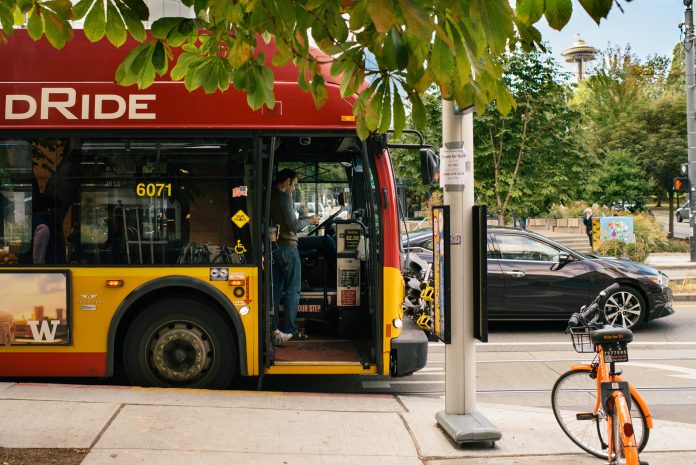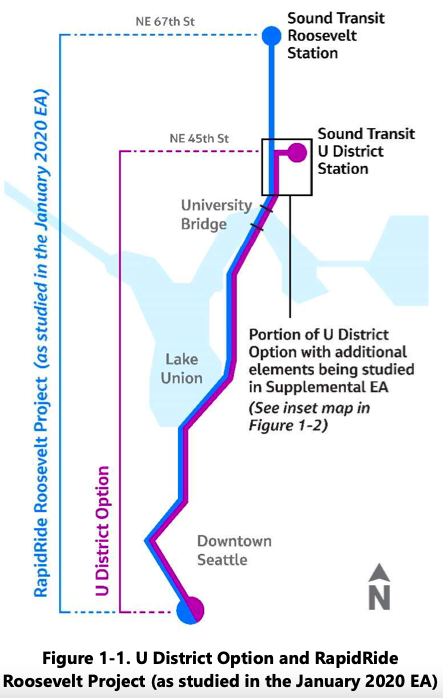The Seattle Department of Transportation and King County Metro recently reneged on the voter-approved promise of a Roosevelt RapidRide (J Line) by shortening the line to end in the University District. The reason they gave in October was the loss “of anticipated capital and operating funds due to the economic impacts from the COVID-19 pandemic.” But just a few weeks later, the President signed a trillion dollar infrastructure bill that invests over $39 billion in transit, one of the biggest rail and bus investments in US history. Despite this, the city and county quietly closed the comment period on the matter, failing to reverse their already outdated decision.
The city and county should deliver what the voters approved. Enclosed is a letter from the Roosevelt Neighborhood Association (I sit on the board), laying out the reasons for doing so. Please also sign this online email to the relevant transit leaders and the City and County Council members they report to.
RNA Letter by Natalie Bicknell on Scribd
A few highlights from the letter:
Roosevelt is an ideal connection to the RapidRide. It is the second fastest growing neighborhood in Seattle by percentage, falling only behind South Lake Union, which is on the other end of the line.
The decision to cut the line short is a terrible decision for the environment. Roosevelt is a car-lite and freeway adjacent neighborhood that is starting to build apartments without parking, raising the opportunity for seriously reducing vehicle trips per person. It’s the terminus for several major bus routes; adding a third transfer to south lake union (from bus to link and back to bus) from the many surrounding white-collar neighborhoods will keep people in cars and off transit for years to come.
It’s a waste of capital because by leaving the last mile unfinished, the project generates most of the cost without bringing as much of the benefits. It also wastes some of the likely matching funds that will be available through the federal infrastructure bill, and requires serious gumming up of the University District and awkward transfers for the rerouting to work. This kind of shortsightedness has plagued our transit agencies for decades, and it’s a tremendous waste of both political and financial capital.
It is bad for people biking and wastes many of the millions already spent on bike lanes in Northeast Seattle because they are left as bike lanes to nowhere. This is because the Roosevelt Line was supposed to come with a northbound protected bike lane to parallel the southbound protected bike lane on Roosevelt. Until then, that southbound lane, and the major east/west connections on NE 65th Street and NE Ravenna Boulevard reaching all the way to Greenlake, will remain disconnected to the commercial core. As a member of the “I’ll bike when it doesn’t feel like I’m going to die” crowd – I can attest that the current setup on 12th Avenue NE is why those bike lanes sit empty so often.
It’s a blow to opportunity and justice. While Roosevelt is historically White, it’s one of the most rapidly diversifying neighborhoods in Seattle. It has been identified as providing among the highest access to opportunity in Seattle with the lowest displacement risk. We also welcome our struggling neighbors. With Cedar Crossing over 250 deeply affordable homes are being built next to our station, the majority of which are large family units, over a subsidized daycare. Our bus lines also connect us to hundreds more affordable homes throughout the RapidRide corridor. These families should have access to the full plans for the J line.
It’s based on outdated and wrong assumptions. Projected tax revenues have recovered, and the Biden infrastructure bill means that the capital funding picture is substantially better than it has been for years, and this is a shovel ready project.
In short, terminating RapidRapid J in the U District a foolish decision. It shortchanges a dense, fast growing, fast diversifying neighborhood with high upward mobility and great affordable housing. It leaves bikers and bus riders out in the cold and likelier to ride in their cars. It makes us more vulnerable to climate change. And it gives up a lot of the value of the project without saving much money.
Please take a minute and join us in opposing it, and please alert your friends and neighbors as well.
Thank you!

Ron Davis (Guest Contributor)
Ron Davis is an entrepreneur, policy wonk, political consultant, and past candidate for Seattle City Council. He is focused on making his community a place where anyone can start a career, raise a family, and age in place without breaking the bank. He has a JD from Harvard Law School and lives in Northeast Seattle with his wife — a family physician — and their two boys.



